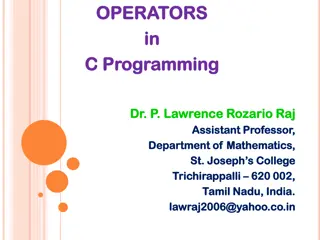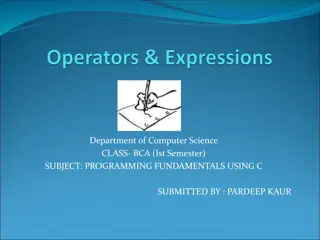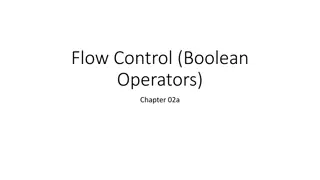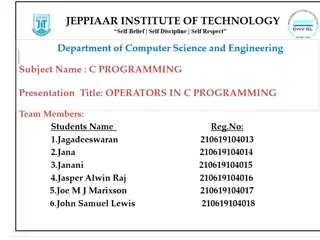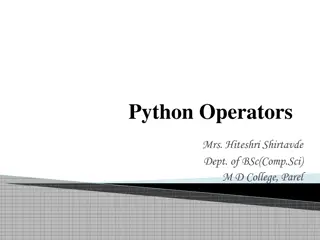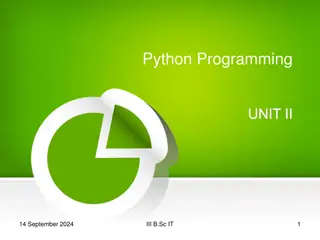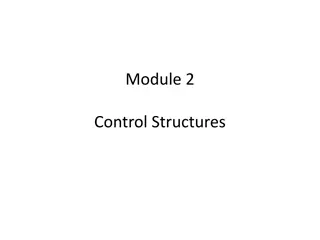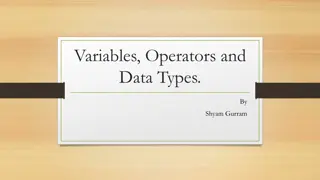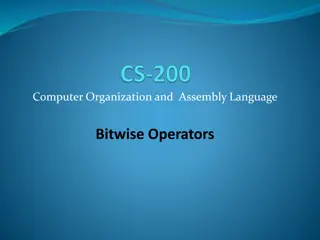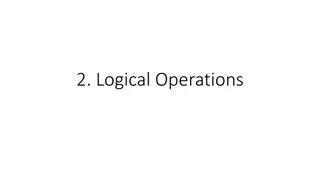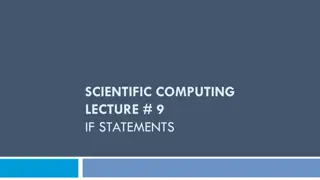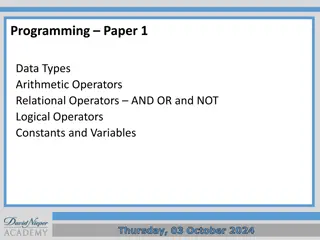Understanding Operators in C++ Programming
Explore the different types of operators in C++ such as arithmetic, relational, and logical operators. Learn how these operators work and their specific use cases in programming. Gain insight into examples and descriptions of each operator type, enhancing your understanding of C++ programming concepts.
Download Presentation

Please find below an Image/Link to download the presentation.
The content on the website is provided AS IS for your information and personal use only. It may not be sold, licensed, or shared on other websites without obtaining consent from the author. Download presentation by click this link. If you encounter any issues during the download, it is possible that the publisher has removed the file from their server.
E N D
Presentation Transcript
Operator Lecture 6
An operator is a symbol that tells the compiler to perform specific mathematical or logical manipulations. C++ is rich in built-in operators and provide the following types of operators Arithmetic Operators Relational Operators Logical Operators Bitwise Operators Assignment Operators Misc Operators
Arithmetic Operators There are following arithmetic operators supported by C++ language Assume variable A holds 10 and variable B holds 20, then Operato r Description Example + Adds two operands A + B will give 30 - Subtracts second operand from the first A - B will give -10 * Multiplies both operands A * B will give 200 / Divides numerator by de-numerator B / A will give 2 % Modulus Operator and remainder of after an integer division B % A will give 0 ++ Increment operator, increases integer value by one A++ will give 11 -- Decrement operator, decreases integer value by one A-- will give 9
Relational Operators There are following relational operators supported by C++ language Assume variable A holds 10 and variable B holds 20, then Operator Description Example = = Checks if the values of two operands are equal or not, if yes then condition becomes true. (A == B) is not true. != Checks if the values of two operands are equal or not, if values are not equal then condition becomes true. (A != B) is true. > Checks if the value of left operand is greater than the value of right operand, if yes then condition becomes true. (A > B) is not true. < Checks if the value of left operand is less than the value of right operand, if yes then condition becomes true. (A < B) is true. >= Checks if the value of left operand is greater than or equal to the value of right operand, if yes then condition becomes true. (A >= B) is not true. <= Checks if the value of left operand is less than or equal to the value of right operand, if yes then condition becomes true. (A <= B) is true.
Logical Operators There are following logical operators supported by C++ language. Assume variable A holds 1 and variable B holds 0, then Operat or Description Example && Called Logical AND operator. If both the operands are non-zero, then condition becomes true. (A && B) is false. || Called Logical OR Operator. If any of the two operands is non-zero, then condition becomes true. (A || B) is true. ! Called Logical NOT Operator. Use to reverses the logical state of its operand. If a condition is true, then Logical NOT operator will make false. !(A && B) is true.
Assignment Operators There are following assignment operators supported by C++ language Operato r Description Example = Simple assignment operator, Assigns values from right side operands to left side operand. C = A + B will assign value of A + B into C += Add AND assignment operator, It adds right operand to the left operand and assign the result to left operand. C += A is equivalent to C = C + A -= Subtract AND assignment operator, It subtracts right operand from the left operand and assign the result to left operand. C -= A is equivalent to C = C - A *= Multiply AND assignment operator, It multiplies right operand with the left operand and assign the result to left operand. C *= A is equivalent to C = C * A /= Divide AND assignment operator, It divides left operand with the right operand and assign the result to left operand. C /= A is equivalent to C = C / A %= Modulus AND assignment operator, It takes modulus using two operands and assign the result to left operand. C %= A is equivalent to C = C % A




